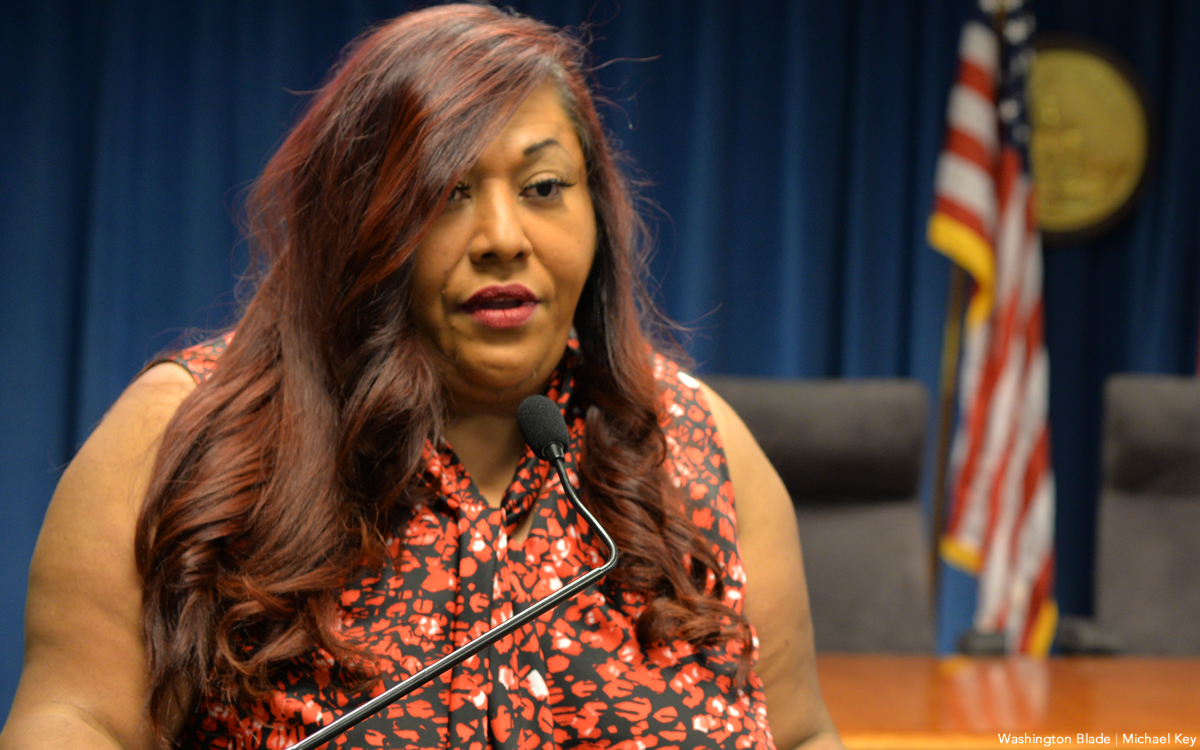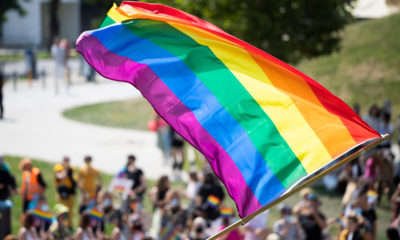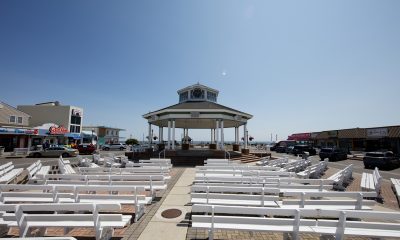Local
Rehoboth officials accused of ‘hassling’ businesses
Code enforcement officer creates stir over visit to Aqua Grill

A code enforcement officer in Rehoboth Beach, Del., became the target of a radio talk show host last weekend after the officer told the gay bar and restaurant Aqua Grill that it violated a local ordinance for flying a flag two inches too low over the sidewalk next to its entrance.
The civilian enforcement officer informed Aqua’s manager of the code violation on May 13 after determining that a flag with the inscription “Open – Welcome to Beautiful Baltimore Avenue” dipped below an 80-inch minimum height restriction for flags extending into public spaces, according to Aqua Grill co-owner Joe Maggio.
“He said we were being cited and we would receive a letter in the mail,” said Maggio, who told the Blade he couldn’t confirm over the weekend whether the bar would be fined for the height violation.
“He could have come in and said, ‘hey, it needs to be raised two inches.’ And we would have been happy to pull out a drill and move it,” said Maggio.
The popular bar and restaurant decided instead to have someone shear off the bottom of the flag with a pair of scissors to comply with the height restriction, Maggio said.
A city official said on Monday said Aqua Grill wasn’t fined and that the enforcement officer only issued a warning, saying the city would give the establishment time to correct the infraction.
But news of the enforcement action created a stir when an Aqua Grill customer present during the visit by the enforcement officer posted an account of the incident on Facebook.
Sussex County radio host Dan Gaffney joined gay supportive Delaware State Rep. Pete Schwartzkopf (D-Rehoboth Beach) and other Aqua Grill customers in criticizing the city for appearing to be hurting local businesses through unnecessary regulations.
“This is stupid beyond belief,” Schwartzkopf wrote on Facebook. “In this economy, they are hassling businesses? I thought it might’ve been the American flag but we are talking about an ‘Open’ sign!”
Rehoboth Beach City Manager Gregory Ferrese said on Monday that the code enforcement officer has found violations of the height restriction for flags in 29 businesses so far this year. He said no specific type of business was being singled out in the enforcement action and that all businesses contacted so far have been given warning notices rather than a fine.
Ferrese and the city’s public works director, Mel Craig, who is gay, told the Blade that enforcement of the height regulation for flags hanging over public spaces like sidewalks was prompted by complaints from the public.
“I’ve gotten hit in the face by flags on a windy day when I walk down the sidewalk,” Craig said.
“If a kid gets hit in the eye with a flag, that’s a big deal,” said Ferrese.
According to Ferrese, city regulatory officials determined that the city is required to enforce the flag height restriction in order to comply with the Americans with Disabilities Act, or ADA, a federal law. The law, among other things, requires cities and towns to make sure the “path of travel” along public spaces such as sidewalks doesn’t include a potential obstruction for people with disabilities, including blind people.
An ADA official with the U.S. Justice Department in Washington, which enforces the statute, said the law and the regulations implementing it make no specific mention of flags, only that local jurisdictions should ensure that sidewalks and other public spaces don’t create a hazard for disabled people.
Jacques LeClair, owner of Rehoboth’s Proud Book Store, said he was among the first businesses approached by code enforcement officer Bobby Edmonds about flying his own flag below the height restriction.
“He was very polite. I got a letter from his office saying I was in violation,” LeClair said. “They gave me a period of time to correct it. I corrected it.”
LeClair added, “It’s not that they are picking on any one person or business. They are picking on everyone.”
Chris Beagle, a Rehoboth real estate agent and Aqua Grill customer, said the flag enforcement visit at Aqua raised concern within the local LGBT community because of its timing. He noted that it came on the first day Aqua opened for business for the 2011 beach season.
Beagle noted it also came eight months after Aqua’s other owner, Bill Shields, was mistakenly arrested and finger printed for allegedly violating another ordinance that prohibits restaurants and bars from allowing customers to stay on outdoor patios after 11 p.m.
Police raided 12 establishments for the patio violation during a crackdown last year that took place mostly over Labor Day weekend. Authorities now admit that Aqua was among just two or three of the establishments that were incorrectly targeted for the crackdown.
Shields said a Rehoboth Beach police officer who arrested him refused to listen to his attempt to explain that Aqua and other establishments that were in business before the patio ordinance was enacted are exempt from the ordinance through a grandfather clause.
Rehoboth’s police chief later acknowledged that the officer made a mistake by arresting Shields, saying the officer wasn’t aware that Aqua was exempt from the ordinance. Police later dropped the charge, but Shields said authorities have yet to follow through with a promise to expunge his arrest record.
With that as a backdrop, Beagle said the code enforcement visit to Aqua over the flag issue last weekend was “really bad timing” and a development that could give the impression to the LGBT community that a gay business is being targeted.
“It was very disheartening to see this happen on opening night,” said Beagle, who was present at the bar and saw Edmonds arrive wearing a jacket with the inscription “Code Enforcement.”
Maggio said he and other business owners and longtime residents of Rehoboth, both gay and straight, are “fed up” with what they view as an anti-business attitude in a city whose economy is dependent on small businesses.
He said he and others dissatisfied over the city’s regulatory policies are supporting gay businessman Thomas McGlone, an investment adviser, who is running against longtime Rehoboth Mayor Samuel Cooper in the city’s Aug. 13 mayoral election.
Cooper disputes claims that he is anti-business. He has said he supports local laws and regulations that prevent bars and other entertainment establishments from spoiling Rehoboth’s status and tradition as a family-oriented vacation destination.
Two of the city’s six elected commissioners, Dennis Barbour, who is gay, and Pat Coluzzi, who is lesbian, say they favor a balance between regulations needed to prevent disruptive businesses and assurances that businesses aren’t hurt by overregulation.
The two have spoken out against the patio crackdown last year and called for regulatory changes.
District of Columbia
Ruby Corado sentencing postponed for third time
Attorneys say former Casa Ruby director has ‘significant medical issues’

A federal judge on April 8 approved a request by defense attorneys to postpone the sentencing of Ruby Corado, the founder and executive director of the now closed D.C. LGBTQ community services organization Casa Ruby on a charge of wire fraud, from April 29 to July 29.
Court records show that Judge Trevor N. McFadden of the U.S. District Court for the District of Columbia approved a motion filed by Corado’s two defense attorneys on that same day calling for the sentencing postponement on grounds of health issues.
“Ms. Corado has significant medical issues,” the April 8 motion states. “She has an important medical appointment related to one of her diagnoses scheduled in June 2025 and will need time to recover from that appointment,” it says.
The motion gives no further details on Colorado’s medical issues. A.J. Kramer, director of the D.C. Office of the Federal Public Defender, whose attorneys are representing Corado, said the office has a policy of never disclosing specific medical related information regarding its clients.
Court records show that prosecutors with the Office of the U.S. Attorney for D.C. did not object to the defense motion seeking the third sentencing postponement.
The records show that an earlier postponement of the sentencing, from March 28 to April 29, was initiated by the judge due to a scheduling conflict. The first postponement from Jan. 10 to March 28 came at the request of Corado’s attorneys, court records show.
Corado pleaded guilty on July 17, 2024, to a single charge of wire fraud as part of a plea bargain deal offered by prosecutors. The charge to which she pleaded guilty says she allegedly diverted at least $150,000 “in taxpayer backed emergency COVID relief funds to private offshore bank accounts for her personal use,” according to a statement released by the U.S. Attorney’s office.
Prosecutors have said funds that Corado allegedly diverted for her own use were intended to be used by Casa Ruby in support of its various programs, including housing services for homeless LGBTQ youth and support for LGBTQ immigrants.
The U.S. Attorney’s statement also notes that in 2022, when “financial irregularities at Casa Ruby became public,” Corado sold her home in Prince George’s County, Md. and “fled to El Salvador.” It was at that time that Casa Ruby ceased its operations.
Court records show that FBI agents arrested Corado on March 5, 2024, at a hotel in Laurel, Md., shortly after she returned to the U.S. At the request of her attorney and against the wishes of prosecutors, another judge at that time agreed to release Corado into custody of her niece in Rockville, Md., under a home detention order.
The release order came seven days after Corado had been held in jail at the time of her arrest by the FBI.
Under the federal wire fraud law Corado could be sentenced to a possible maximum sentence of 30 years in prison, according to the U.S. Attorney’s statement. However, court observers have said that due to Corado’s decision to waive her right to a trial and plead guilty, prosecutors will likely ask the judge to hand down a lesser sentence than the maximum sentence.
The statement by prosecutors points out that Corado’s decision to plead guilty to the one charge came after she had been charged in a criminal complaint filed on March 1, 2024, with bank fraud, wire fraud, laundering of monetary instruments, monetary transactions in criminally derived proceeds, and failure to file a report of foreign bank accounts.
All those charges except for the wire fraud charge were dropped at the time of her guilty plea.
District of Columbia
A room with Pride: D.C.’s LGBTQ history finds a new home at the Eaton
New suites highlight city’s queer community

Blocks away from where Frank Kameny once organized the first pickets for gay rights in Washington, a new hotel suite invites guests to relax, recharge, and revel in the LGBTQ history of the city with the capital’s first-ever Pride-themed room at the Eaton Hotel.
From the walls covered in Washington Blade archival photos from the past 50 years, to a vinyl library that spans decades and genres of music celebrated by LGBTQ fans, and little affirmations written on the mirrors, it becomes clear as soon as you open the door that this room is one of a kind.
The Blade sat down with Nina Ligon, the director of culture for the Eaton, in the suite to discuss why the boutique hotel has chosen to debut a Pride-themed room and how their unique mission-driven hospitality is at the center of it all.
Starting with how the relationship between the Blade and Eaton came to be, Ligon explained that the collaboration with D.C.’s principal LGBTQ newspaper has been around longer than she has been with the hotel.
“The Blade has always been present,” Ligon said. “It’s one of the entities here in the city that’s just always been around. When I came into my position here at Eaton, Sheldon Scott — our original director of culture who helped open the hotel — already had a relationship with Stephen [Rutgers] and other members of the Washington Blade. Through that we have been able to establish a really strong relationship in the city.”
That relationship flourished after the boutique hotel, which sees itself as more than a hotel — but a cultural hub for those wishing to explore Washington — was nominated for the Best of LGBTQ DC Awards, given out and published by the Blade.

“Beginning in 2022 we were first voted for best LGBTQ hotel in the city by the Best of LGBTQ DC Awards,” she said. “In 2023 we fell off, but that’s all right. We did get Editor’s Choice in 2024, and we’re gonna make a comeback.”
That comeback, Ligon hopes, is aided by the addition of the new Capital Pride-themed hotel suite, which used feedback from LGBTQ hotel staff to determine what went in the room.
“It’s community. We have a really great team here at Eaton, so we were able to put together a committee with anyone who wanted to be involved and have some say. And that’s not just the pride suite specifically, but World Pride in general — in our pride efforts, 365, right throughout the year. A lot of these,” she said, pointing to the walls covered in framed photos taken from the Blade archive, “are ideas that came up during those early meetings just a few months ago. There were discussions of inflatable chairs and disco balls, and I was for it. I’m here to support their creative vision. And you know, we have to involve the corporate folks, and they’re a little more traditional than some of us. But the team really came together with some of the pieces and the timeline wall art that we’re working on.”
Ligon continued, explaining that special attention was given to ensure diverse LGBTQ experiences are represented in the room. From the pictures of LGBTQ icons like Marsha P. Johnson and RuPaul, to the music on their sound system (including Chappell Roan’s “The Rise and Fall of a Midwest Princess” and Troye Sivan’s “Bloom”), and the quotes on the walls, their goal was to uplift the whole LGBTQ community rather than one particular identity.
“My colleague, Eduardo [Romero], who’s been just a beam of light in my life, brought this to my attention. As a Black woman, I was reading through the Blade’s archive links and was sifting through some of those and he was like, ‘Okay, yeah, these look good, but there’s some people who are missing.’ Capital Pride has been traditionally cis, white male led. He helped me, as a Black woman, to step back and say. ‘Say, oh, wait, there’s more that we can be representing here. There are more people we could be representing.’ And so I reached out to DC Black Pride to see what image imagery they may have had and what input they had. And we were able to come up with a little something.”
As the tour of the room came to a close, Ligon told the Blade what she hopes people get from staying in this suite.
“When it comes to Pride, Pride is resistance,” she said. “Pride is more than just a party. Pride is an opportunity. It started with people who were fighting for their rights and their mere existence. And so I really want people, whether they come here to party or to take a load off, I really want them to take some time to reflect and see Pride for what it is, and that first being a form of resistance as we chart the course forward into a brighter future for the LGBTQ community and for all. None of us are free until we are all free. And I hope that this will be a reflection of that.”
The Eaton Hotel is at 1201 K St., N.W.

Opinions
We must show up to WorldPride 2025 in D.C.
Boycotts offer symbolic protest, but absence creates silence

As an LGBTQI+ activist from Argentina, a country currently facing deep setbacks under an openly anti-rights government, I understand the frustration and fear many are expressing about attending WorldPride 2025 in the United States. I also understand the symbolic weight of showing up anyway.
Following the announcement by Egale Canada and the African Human Rights Coalition that they are withdrawing support for WorldPride due to the Trump administration’s anti-LGBTQI+ stance, concerns have rightly been raised about safety, complicity, and principle. These concerns must not be dismissed. But they must be responded to with a deeper strategic reflection: Visibility, presence, and collective action remain our greatest tools in confronting oppression.
Boycotts may offer symbolic protest, but absence creates silence
WorldPride is not organized by the U.S. government. It is a platform created by and for LGBTQI+ civil society — local activists, grassroots groups, trans-led collectives, BIPOC-led organizations, and everyday people building community despite hostile political environments. Boycotting this space sends a message not only to the Trump administration, but to our own movement: That when things get hard, we retreat.
History teaches us otherwise.
In 1990, amid the AIDS crisis and government neglect, activists did not boycott — they stormed the National Institutes of Health and the FDA. In 2014, when Russia passed its “gay propaganda” law, global solidarity at the Sochi Olympics became a powerful moment of protest and resistance. And in 2020, amidst a pandemic and police violence, Pride went digital but never disappeared.
If we set the precedent that global LGBTQI+ events cannot happen under right-wing or anti-LGBTQI+ governments, we will effectively disqualify a growing list of countries from hosting. That includes not only the U.S. under Trump, but Hungary, Italy, Uganda, Poland — and even my own country, Argentina, under Javier Milei. Yet ILGA World still plans to convene its 2027 conference in Buenos Aires, and rightly so. We must not surrender global platforms to the very governments that wish to erase us.
WorldPride is not a reward for good governance. It’s a tool of resistance
To those who say attending WorldPride in D.C. normalizes Trump’s policies, I say: What greater statement than queer, trans, intersex, and nonbinary people from around the world gathering defiantly in his capital? What more powerful declaration than standing visible where he would rather we vanish?
Safety is paramount, and all governments — including the U.S. — must guarantee the protection of LGBTQI+ participants. But refusing to engage is not the answer. In fact, visibility in hostile spaces has always been a hallmark of our movement’s strength. We showed up at Stonewall. We marched on Washington in 1979. We protested during the AIDS crisis, and we will show up again now — not in spite of adversity, but because of it.
We are in a global moment of rollback. Division is what our opponents want
The rise of anti-gender ideology and trans-exclusionary narratives has created fertile ground for far-right movements worldwide. In this moment, LGBTQI+ solidarity must be global, intersectional, and uncompromising. We cannot afford to fracture our own movement based on geopolitical fault lines.
Egale Canada and the African Human Rights Coalition raised legitimate criticisms — of U.S. foreign policy, immigration barriers, and systemic racism. But those issues must be confronted within WorldPride, not from outside it. We must bring those critiques into plenaries, panels, and the streets of Washington. We must create space for diasporic, racialized, and grassroots-led voices. We must use this moment to hold institutions accountable and shift the power of Pride to those most affected.
Because that is what solidarity looks like — not abandonment, but engagement.
WorldPride 2025 must not be a party disconnected from reality. It must be a protest rooted in our global truths.
Let us not cede this space. Let us make it ours.
Mariano Ruiz is the president of Derechos Humanos y Diversidad Asociación Civil in Argentina. He is also a 2019 Columbia HRAP Alumni.
-

 Virginia2 days ago
Virginia2 days agoYoungkin calls on gay Va. GOP LG candidate to exit race over alleged ‘porn’ scandal
-

 Commentary4 days ago
Commentary4 days agoA conversation about queers and class
-

 Kenya4 days ago
Kenya4 days agoKenya Red Cross-owned hotel to host anti-LGBTQ conference
-

 Opinions3 days ago
Opinions3 days agoNavigating employer-sponsored health insurance, care













